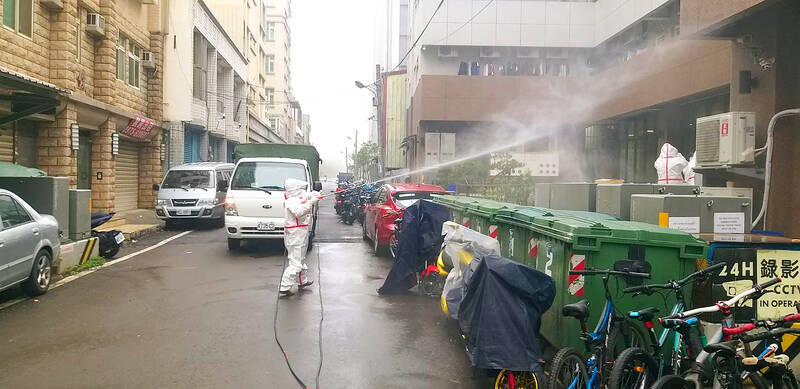A complex in Hsinchu Industrial Park (新竹工業區) was sold for a record NT$376,000 (US$12,381.45) per ping (3.3m2), as demand for manufacturing property remains solid, despite economic uncertainty and unfavorable legislation, CBRE Taiwan said on Tuesday.
That represented a price rise of 34 percent compared with property transactions in the area last year, offering a boost to the local property market, which is widely expected to experience a correction after a ban on transfers of presale houses cleared the legislature earlier this month.
The complex has a floor area of 1,550 ping and a land area of 1,358 ping at the industrial park in Hsinchu County’s Hukou Township (湖口).

Photo: Huang Mei-chu, Liberty Times
CBRE Taiwan said that tech firms, electronics makers and biotechnology firms had expressed an interest in purchasing the property prior to the sale.
The 11-year-old complex is well maintained and qualified for a floor area ratio of 300 percent, from its current 111 percent, and might receive even more favorable construction terms if it meets the requirements of government programs that support industrial development, CBRE Taiwan said.
Those conditions are behind the interest in the complex and helped it attract the record bid, it said.
Self-occupancy needs continue to be important in driving industrial property transactions this year, even though interest rate hikes and economic uncertainty have cast a shadow over the market outlook, CBRE Taiwan said.
Industrial property transactions last year declined 7 percent to NT$146.2 billion, faring relatively well compared with a 28 percent slump in commercial and land deals to NT$333 billion, it said.
Properties in the Hsinchu Industrial Park and Hsinchu Science Park (新竹科學園區), cradle of the nation’s high-tech ventures, are particularly popular due to limited supply, it said.

CHIP RACE: Three years of overbroad export controls drove foreign competitors to pursue their own AI chips, and ‘cost US taxpayers billions of dollars,’ Nvidia said China has figured out the US strategy for allowing it to buy Nvidia Corp’s H200s and is rejecting the artificial intelligence (AI) chip in favor of domestically developed semiconductors, White House AI adviser David Sacks said, citing news reports. US President Donald Trump on Monday said that he would allow shipments of Nvidia’s H200 chips to China, part of an administration effort backed by Sacks to challenge Chinese tech champions such as Huawei Technologies Co (華為) by bringing US competition to their home market. On Friday, Sacks signaled that he was uncertain about whether that approach would work. “They’re rejecting our chips,” Sacks

NATIONAL SECURITY: Intel’s testing of ACM tools despite US government control ‘highlights egregious gaps in US technology protection policies,’ a former official said Chipmaker Intel Corp has tested chipmaking tools this year from a toolmaker with deep roots in China and two overseas units that were targeted by US sanctions, according to two sources with direct knowledge of the matter. Intel, which fended off calls for its CEO’s resignation from US President Donald Trump in August over his alleged ties to China, got the tools from ACM Research Inc, a Fremont, California-based producer of chipmaking equipment. Two of ACM’s units, based in Shanghai and South Korea, were among a number of firms barred last year from receiving US technology over claims they have

BARRIERS: Gudeng’s chairman said it was unlikely that the US could replicate Taiwan’s science parks in Arizona, given its strict immigration policies and cultural differences Gudeng Precision Industrial Co (家登), which supplies wafer pods to the world’s major semiconductor firms, yesterday said it is in no rush to set up production in the US due to high costs. The company supplies its customers through a warehouse in Arizona jointly operated by TSS Holdings Ltd (德鑫控股), a joint holding of Gudeng and 17 Taiwanese firms in the semiconductor supply chain, including specialty plastic compounds producer Nytex Composites Co (耐特) and automated material handling system supplier Symtek Automation Asia Co (迅得). While the company has long been exploring the feasibility of setting up production in the US to address

OPTION: Uber said it could provide higher pay for batch trips, if incentives for batching is not removed entirely, as the latter would force it to pass on the costs to consumers Uber Technologies Inc yesterday warned that proposed restrictions on batching orders and minimum wages could prompt a NT$20 delivery fee increase in Taiwan, as lower efficiency would drive up costs. Uber CEO Dara Khosrowshahi made the remarks yesterday during his visit to Taiwan. He is on a multileg trip to the region, which includes stops in South Korea and Japan. His visit coincided the release last month of the Ministry of Labor’s draft bill on the delivery sector, which aims to safeguard delivery workers’ rights and improve their welfare. The ministry set the minimum pay for local food delivery drivers at